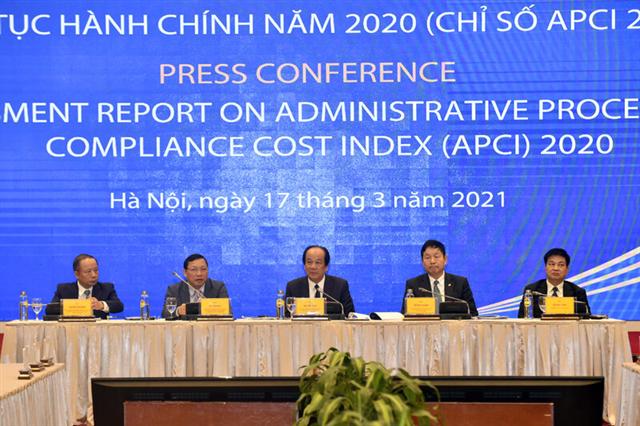Compliance cost for tax payment lowest among administrative procedures in Vietnam
Compliance cost for tax payment lowest among administrative procedures in Vietnam
Lower compliance cost for administrative procedures ensure a healthy and transparent business environment, while creating the foundation for enterprises’ development, Minister and Chairman of the Government Office Mai Tien Dung has said.
To realize taxation procedures, enterprises in Vietnam have to spend an average of 3.8 hours and VND267,000 (US$11.5), the lowest compliance cost among nine major groups of administrative procedures in Vietnam.

Minister and Chairman of the Government Office Mai Tien Dung (middle) at the press conference. Photo: Nhat Bac
|
Minister and Chairman of the Government Office Mai Tien Dung revealed the information at the launch of the annual assessment report on Administrative Procedure Compliance Cost Index (APCI) 2020 on March 17.
The report, first launched in 2018, assesses the administrative reform progress and government’s efforts in improving the business environment by analyzing enterprises’ experience in nine groups of administrative procedures, including investment, cross-border trade transaction, business registration/starting business, environment, license and practicing certificate, land, construction, tax and specialized inspection.
The highest compliance cost is under the field of environment with an average of VND63.3 million (US$2,730) per procedure, followed by construction with VND25.27 million (US$1,090). Locals would have to pay for VND952,000 (US$41) to start a business, while the cost for specialized inspection, land, cross border trade transactions, license/practicing certificate, and investment is in range of VND3-9 million (US$130-388).
Tax is also the field with the most improvement score with 5.6 points against the 2019 report, which are reflected by a decline of 19% in time for enterprises to realize taxation procedures and 79% of the direct cost, resulting in a reduction of 66% in compliance cost for enterprises in this regard.
The APCI 2020 report noted the majority of taxation procedures have been shifted online, in turn minimizing any inconvenience for tax payers in realizing their tax liabilities.
Specialized inspection came in second place in the APCI 2020 report with five points improvements, which are reflected in lower time and cost for enterprises.
“Customs authorities should continue to apply IT in processing customs procedures to further improve scores for specialized inspection,” added the report.
Environment and license/practicing certificate claimed the third and fourth ranks with corresponding improvements of 0.5 and 0.2 points, for which the report suggested more efforts needed to simplify administrative procedures in those fields.
The remaining five groups of business registration/starting business, investment, construction, land and cross-border trade transactions have seen their scores declined, for which the report stressed the important of continuous reform.
Lessons learned for administrative reform
Minister Dung noted the importance of moving administrative procedures online to further save costs for enterprises, saying the majority of procedures that score high in APCI 2020 “are those with high level of IT application”.
Dung also urged local authorities to continue lowering compliance cost for enterprises to ensure a healthy and transparent business environment and create the foundation for enterprises’ development.
“Unofficial costs in realizing administrative procedures are major hindrance to socio-economic development and causing public frustration,” added Dung.
According to Dung, a lesson drawn from the APCI report over the past three years is a change in state administration method from “prior” to “post” review in issuing different business licenses for enterprises.
“While the move has totally transformed the way the state regulates different economic fields, it has also changed enterprises’ awareness on their business responsibilities,” he continued.
Dung also acknowledged businesses’ recommendations of predictability and clarity on legal environment for enterprises to better control their legal compliance capability.



























